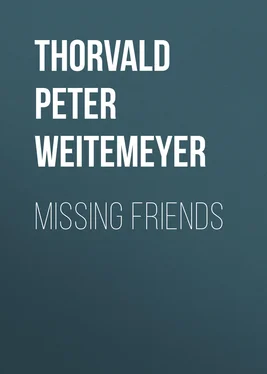Thorvald Peter Ludwig Weitemeyer - Missing Friends
Здесь есть возможность читать онлайн «Thorvald Peter Ludwig Weitemeyer - Missing Friends» — ознакомительный отрывок электронной книги совершенно бесплатно, а после прочтения отрывка купить полную версию. В некоторых случаях можно слушать аудио, скачать через торрент в формате fb2 и присутствует краткое содержание. Жанр: Путешествия и география, foreign_antique, foreign_prose, на английском языке. Описание произведения, (предисловие) а так же отзывы посетителей доступны на портале библиотеки ЛибКат.
- Название:Missing Friends
- Автор:
- Жанр:
- Год:неизвестен
- ISBN:нет данных
- Рейтинг книги:3 / 5. Голосов: 1
-
Избранное:Добавить в избранное
- Отзывы:
-
Ваша оценка:
- 60
- 1
- 2
- 3
- 4
- 5
Missing Friends: краткое содержание, описание и аннотация
Предлагаем к чтению аннотацию, описание, краткое содержание или предисловие (зависит от того, что написал сам автор книги «Missing Friends»). Если вы не нашли необходимую информацию о книге — напишите в комментариях, мы постараемся отыскать её.
Missing Friends — читать онлайн ознакомительный отрывок
Ниже представлен текст книги, разбитый по страницам. Система сохранения места последней прочитанной страницы, позволяет с удобством читать онлайн бесплатно книгу «Missing Friends», без необходимости каждый раз заново искать на чём Вы остановились. Поставьте закладку, и сможете в любой момент перейти на страницу, на которой закончили чтение.
Интервал:
Закладка:
We had very little wind in the sails as we came along, and nothing can be thought more beautiful than the climate we now enjoyed. I am now so used to the Queensland climate that I take it as a matter of course, but how can I give the reader an adequate idea of the joy I then felt in the very fact of my existence: the beautiful sun in the day, the glorious sunset in the evening, the full moon, and the sparkling rippling silent water! Then all these islands we passed were so full of mysterious interest, while the vast unknown mainland lay beyond. The reckless spirit of which I spoke as universal when we came on board in Hamburg, seemed now to have taken wings and fled. Indeed, the main trouble on board just now was how we should make a good impression when we landed. It was looked upon as a matter of honour that each should be on his very best behaviour when we came ashore, and I know of several of whom it was thought by the rest that their clothes were scarcely good enough, and who were lent by the others sufficient to appear in better trim and circumstances. The ship was now so clean that one might have eaten his dinner off the decks anywhere. Altogether there was a decided change for the better since the day we first saw Australia. At last, one day after having sailed along the apparently uninhabited coast for eight or nine days, we suddenly rounded a cliff, sailed into a little bay, and dropped anchor. There lay Bowen in full sight of us, and this was Port Denison. How strange it seemed that these few scattered wooden cottages we saw lying there on the beach in appalling loneliness should be the spot that we, through storm and trouble, had all been trying to reach. For some time not a human being was to be seen. There was a long jetty running out into the water for a great distance, but we did not go alongside. We lay, I think, half a mile out, and we were given to understand that we were not to go ashore before the morrow, and that on landing all our wants would be attended to until we obtained employment. Now it began to look lively on the beach. A lot of people came out on the jetty, and at last a boat, with a dozen gentlemen in it, got under way and pulled straight for the ship. These are Queenslanders, thought I, men who had fought with the Blacks and been on the gold-diggings. Rich, no doubt they were. Oh, how we screamed hurrah! for them, and how kind they looked as they came nearer, waving their handkerchiefs and smiling in response to our greeting. They were not at all ferocious looking; really much the same sort of people we had seen before. Yet what adventures must they not have gone through; what stories could they not tell if they liked? But, of course, that would be beneath their dignity. At last they were on board. Most of them greeted the doctor and captain in German, being, in fact, Germans. After a short interval, one of the Queenslanders, who proved to be the agent and interpreter employed by the Government to attend to us when we came ashore, got up on a big box and made a long speech in German, exhorting us to do well, and gesticulating with much gusto and great force. He advised us to take the first work we could get, and while we were accommodating ourselves to the new habits of life and customs existing in this country, to try to feel contented. "Where," cried he, "will all of you be in twenty years? Some will be dead; others perhaps alive. Some rich and honoured; others perhaps only servants to those among you who are more pushing or lucky. These little children who are now running about us fighting for an orange, may become members of Parliament in time. To-day you start with an equal chance, but from to-morrow your fortunes will begin to alter, and for certain not one of you will for ever forget this day; and no doubt in after years you will look back on to-day often, and as you recall to your mind how your time has been employed, wish you had it over again, that you might act more wisely or become better."
All this was good advice, and very well and kindly spoken. He said much more to the same purpose, but as good advice is everywhere cheap and plentiful, I will not inflict the whole of his carefully prepared speech upon my readers. He spoke for nearly an hour. At last he congratulated us on our clean appearance, wiped his perspiring brow, and the performance was at an end. We were not sorry, to tell the truth—at least I was not, because this was the day on which our best dinner, grey peas stewed with pork, was served out; and as it was past the usual dinner hour when the sermon was over, not only did I stand right in the tempting smell from the kitchen, but I had also noticed how, gradually, as the speech proceeded, the "skaffers," or men whose duty it was to fetch the food from the cook's galley, had one by one crept away, and now they stood in a long row ready with their wooden troughs while the cook began to dish up the peas.
After dinner, when we came on deck again, I heard some one cry out, "Are there any carpenters on board? Carpenters—any carpenters who want employment?"
"Yes!" I was one. Five more came forward. One of the Queenslanders said he wished to engage one or two carpenters. Of course some one acted as interpreter. Well, he would give thirty pounds sterling per annum to a good man. He would also give him his board and lodging. We all thought it a fair offer, although scarcely up to our expectations. But then, again, what were our expectations? Half the time we were afraid we should get nothing at all to do, and the other half we thought we were to pick up bucketsful of gold. Anyhow, we were all anxious to engage, and I, with a full regard to the fact that my only property was a partnership in two hundred and odd empty bottles, was not at all sorry to see that I seemed to find favour in his eyes. I was offered an engagement on the above-named terms. Would I kindly step this way to sign the agreement? A document written in English was placed before me for signature. I could pretty well understand the meaning of it, and an interpreter was there ready enough to explain matters, but there were certain very important features in it which never were explained to me, and which I myself totally overlooked, and if I had seen these I should only have agreed to them as a last resource from starvation. As the agreement was just like those signed by thousands every year all over Queensland to this present day, I will give it here. It ran thus: – promised to serve – for the term of twelve calendar months and to obey all his lawful commands. In return for which, – would pay the sum of £– sterling and rations. Then followed the signatures. I understood that the word "rations" meant my board and lodging, and so it proved in my case, and as it was explained to me; but most of my unfortunate shipmates who signed similar agreements in the same good faith as I found out in a practical manner that to them it had another meaning. It will be noticed that the agreement says nothing whatever about lodging. Legally, a Queensland employer who engages a man for wages and "rations" might let his employé camp under the gum-trees without giving him any sleeping accommodation whatever, and that is very often done. If a man gets a shed or a corner of a stable to live in, it is more than he is entitled to under these agreements. So far as the food is concerned, the word "ration" as used in these agreements means a fixed quantity of certain things, which, therefore, again is all an employé can expect from his master. These consist of twelve pounds of raw beef or mutton, eight pounds of flour, two pounds of sugar and a quarter of a pound of tea. As long as these eatables are tea and sugar, flour and beef, nothing is said as to quality, and the most inferior goods which are in the market are called ration-tea and ration-sugar . But what is an unfortunate new arrival, who never made a cup of tea in his life before, to do, when on his arrival at some out-of-the-way place in the bush his "boss," as the employer in Queensland is called, hands him these rations instead of giving him three square meals a day?
Читать дальшеИнтервал:
Закладка:
Похожие книги на «Missing Friends»
Представляем Вашему вниманию похожие книги на «Missing Friends» списком для выбора. Мы отобрали схожую по названию и смыслу литературу в надежде предоставить читателям больше вариантов отыскать новые, интересные, ещё непрочитанные произведения.
Обсуждение, отзывы о книге «Missing Friends» и просто собственные мнения читателей. Оставьте ваши комментарии, напишите, что Вы думаете о произведении, его смысле или главных героях. Укажите что конкретно понравилось, а что нет, и почему Вы так считаете.












